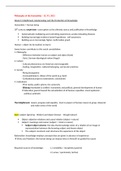Philosophy of the Humanities – S2, P1, 2021
Week 2: Enlightment, Epistemology and the Production of Knowledge
Humanities = Human being
18th century: empiricism = perception as the ultimate source and justification of knowledge
Systematically multiplying and controlling experiences avoids misleading illusions
Building increasingly evidence-based hypotheses : self-awareness
Building up an increasingly higher confirmation graph
Human = object (to be studied, to learn)
Some factors contribute to this social constellation:
1. Philosophy
- Difference between human as subject and object (Kant)
- Geist, German-ideological notion (Hegel)
2. Culture
- Cultural phenomena are historical and changeable
- Feeling, imagination, national belonging, vernacular practices
3. Society
- Rising bourgeoisie
- Cosmopolitanism: citizen of the world (e.g. Kant)
- Civilizational projects (nationalism, colonialism)
4. Institutions
- Print media, public sphere, the university
- Bildung (Humboldt & Schiller): humanistic and political, general development of human
Education geared toward the actualization of all human capacities: moral epistemic,
political, aesthetic
The Enlightment: reason, progress and equality ; trust in powers of human reason to grasp, interpret
and make sense of the world
Kant: subject (ignoring - thinker) and object (known – thought about)
Object: objective relations and causal relation (object = nature)
Subject: meanings and reason (subject = mind or reason)
Subject-object scheme: the idea that knowledge exists of a relation of an image or
representation between the knowing subject and known object
The subject constructs and structures the experience of the object
Rationalism: knowledge employs concepts that are given in advance of experience
Ethics and freedom: the human being can impose laws on himself: be guided by reason
Required sources of knowledge: 1.) sensibility / receptivity (passive)
2.) sense / spontaneity (active)
,Our knowledge doesn’t exist only of observations, but also with an active input of the mind.
We know the things as appearances, imposed forms by the mind (phenomenal world)
The input of the subject is universal: 1.) tools of whatever is reason
2.) not being able to perceive things in themselves (dinge an
sich) but a reason to believe
3.) component human mental activity but also a world
outside it
Man as an empirical object and as a transcendental subject of empirical knowledge
* Knowledge doesn’t have to be justified by experiences, we have to set our emotions aside
* Transcendental subject: universal and timeless, not bound by an era or culture ; valid for all
reasonable subjects
th
19 century: new observations suggest that the Kantian a priori truths are not at all inevitable.
Lorde: plays with ‘light’ (Enlightment)
Different light (notion) on freedom, not circumscribed by whiteness
- White European rationality – poetry’s integration of feeling and thought
implicitly Enlightment took a white rationality
*shareable language transforms when you look critically at the European rationality
- Difference between feelings and social differences
* Black women’s poetry: awaken feelings that are at risks in systems of profit, linear power,
institutional dehumanization
- Self-discovery, shareable language, social transformation
Foucault: Les mots et les choses (1966) : historical development of knowledge of economics, biology
and linguistics
- 1650-1800 : richness, natural history, general grammar
- 19th century : labour, life and language
Mutations in the depth structure of knowledge
Episteme: different conceptions of order, sign and language in different time frames.
frameworks involve historically principles
Large-scale conceptual framework for producing knowledge in a distinctive era
* Historically variable principles and assumptions
- Renaissance : similarities (magic, science and commentary same treatment)
- Classical Time : sign represents a thing (tables) & ordering systems (1600-1800)
- Modern Time : new attention to historical development (organic structures) (1800)
The human mind gets its own fundament: human as subject and object of knowledge
Hegel: The notion of spirit and its historical realization
, The spirit is broader than reason : idealist
encompasses: individual consciousness in relations to others
Geist: - Social institutions (e.g. courts, states) & culture productions
- Collective consciousness (the state of reflection of the society)
Thus, the individual or collective human consciousness or the products of it (philosophy, art, religion)
* a ruse of reason, irrelevant to history once his historic mission is accomplished
* Subjected to the teleological principle of history – art and culture lead toward freedom
Geist (spirit or soul) as only reality, continually developing process of dialectical development.
Volksgeist: forms a folk or nation, the result of world spirit (Geist) in history and the human action
Positivism (19th century): avoiding speculations and therefore facts as only source of knowledge
*New depth structure: question of order discourse central instead of the human
1. The view that only empirical sciences (social sciences) provide valid knowledge or can serve
as the basis for a successful social order
2. The view that the historian should only track down the historical facts and should stay away
from interpretations and value judgments
Hegel rejects Kant’s dualism of sense perception and intellectual thinking
philosophical dilemma: 1.) coincidence, but also ‘coincidence’ conclusions and judgments
2.) necessary mind, actions without a free will are excluded
Solution: development perspective : objective world is the product of the mind and
therefore understandable.
*The mind doesn’t always recognize the product
Dialectical process of negation and abolition: awareness natural awareness self-awareness
absolute knowing
The relationship between object and subject is not constant : topic of thinking,
development
We cannot learn from history: the circumstance for every era and nation are too specific
World history is the necessary process of self-realization of the mind
Nietzsche: will to power
Genealogy = a non-teleological and non-dialectical form of historical analysis, which says that social
phenomena derive from terms of practices and power. form of critical thought
The historical character of social phenomena : in the course of their existence, rituals and practices
acquire contingent purposes that are not contained in
their origin = character in shifting function
Sceptical about Hegel’s theory:
Too much historical consciousness can be dangerous for the life of an individual, folk or
culture





